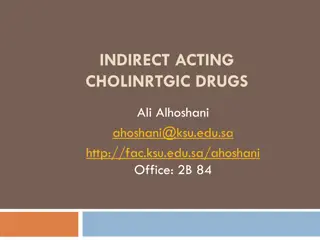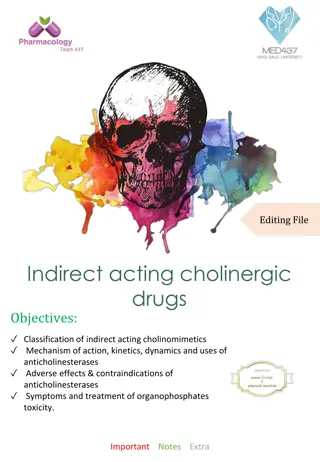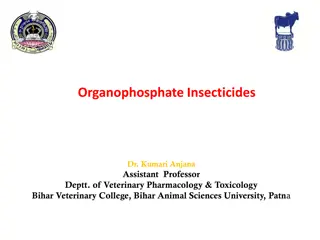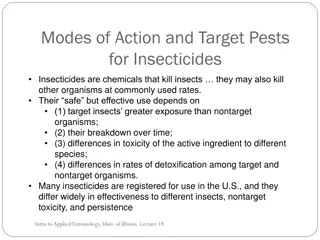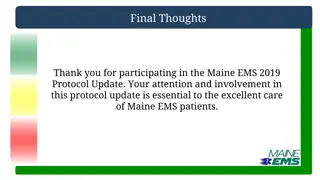Understanding Indirect-Acting Cholinergic Drugs and Their Mechanisms of Action
This lecture covers the classification, mechanism of action, kinetics, dynamics, and uses of indirect-acting cholinomimetics. It discusses anticholinesterases, their adverse effects, contraindications, and the symptoms and treatment of organophosphates toxicity. Reversible and irreversible anticholi
2 views • 24 slides
Understanding Indirect Acting Cholinergic Drugs: Mechanism, Classification, and Clinical Applications
Explore the world of indirect acting cholinergic drugs, also known as anticholinesterases, which work by inhibiting acetylcholinesterase to increase acetylcholine levels at cholinergic receptors. Learn about their mechanisms of action, classification, kinetics, dynamics, uses, adverse effects, contr
1 views • 10 slides
Understanding Organophosphate Insecticides in Veterinary Pharmacology & Toxicology
Organophosphate insecticides, discussed by Dr. Kumari Anjana, Assistant Professor at Bihar Veterinary College, have a significant impact in controlling pests. These compounds inhibit cholinesterase enzymes, and their uses span across various applications including insecticides, acaricides, and herbi
0 views • 23 slides
Overview of Insecticides: Modes of Action, Target Pests, and Types
Insecticides are chemicals used to kill insects, but their effectiveness and safety depend on various factors like target specificity, breakdown over time, and toxicity differences. Different classes of insecticides such as Organochlorines, Organophosphates, Carbamates, Pyrethroids, and Neonicotinoi
0 views • 40 slides
Maine EMS 2019 Protocol Update: Final Thoughts and Training Considerations
Participation in the Maine EMS 2019 Protocol Update is vital for optimal patient care. Additional training in various topics, such as naloxone administration, stroke scales, and surgical cricothyrotomy, is recommended at different EMS levels. Deliberate review of specific areas like recognizing sign
0 views • 5 slides
